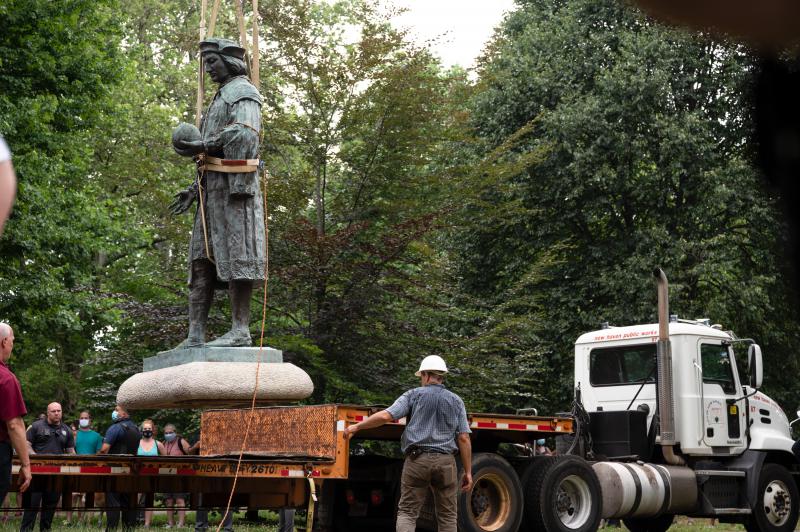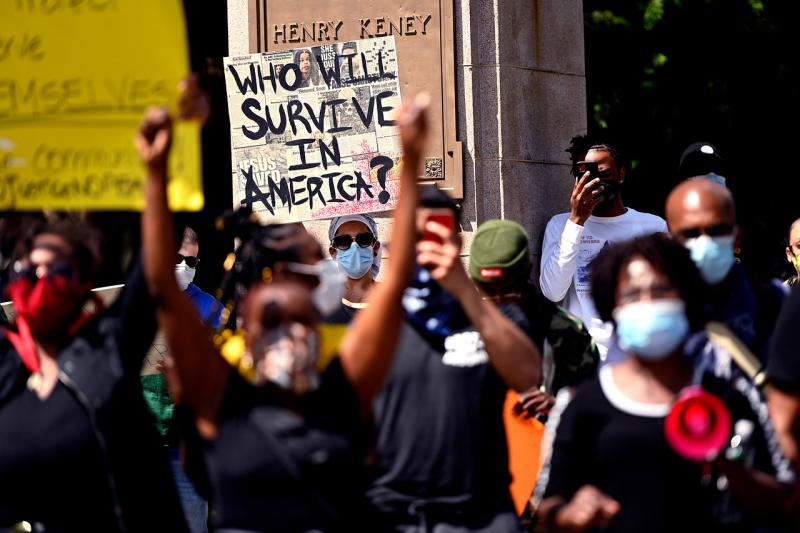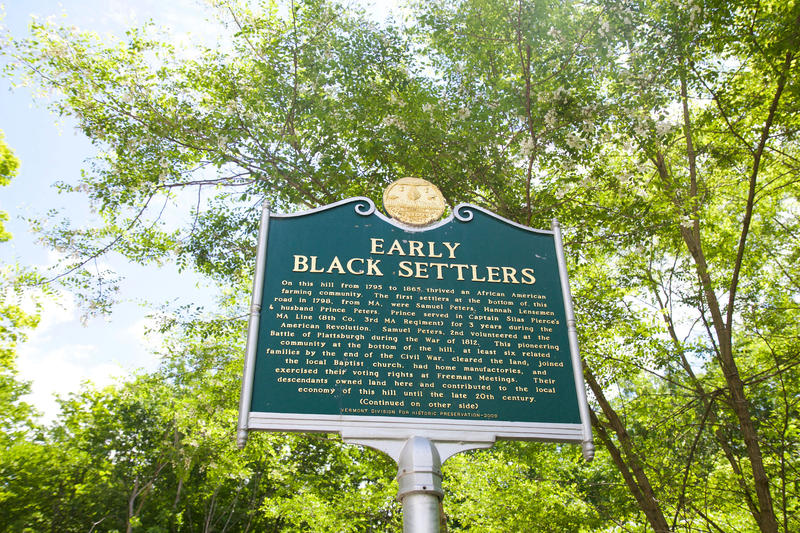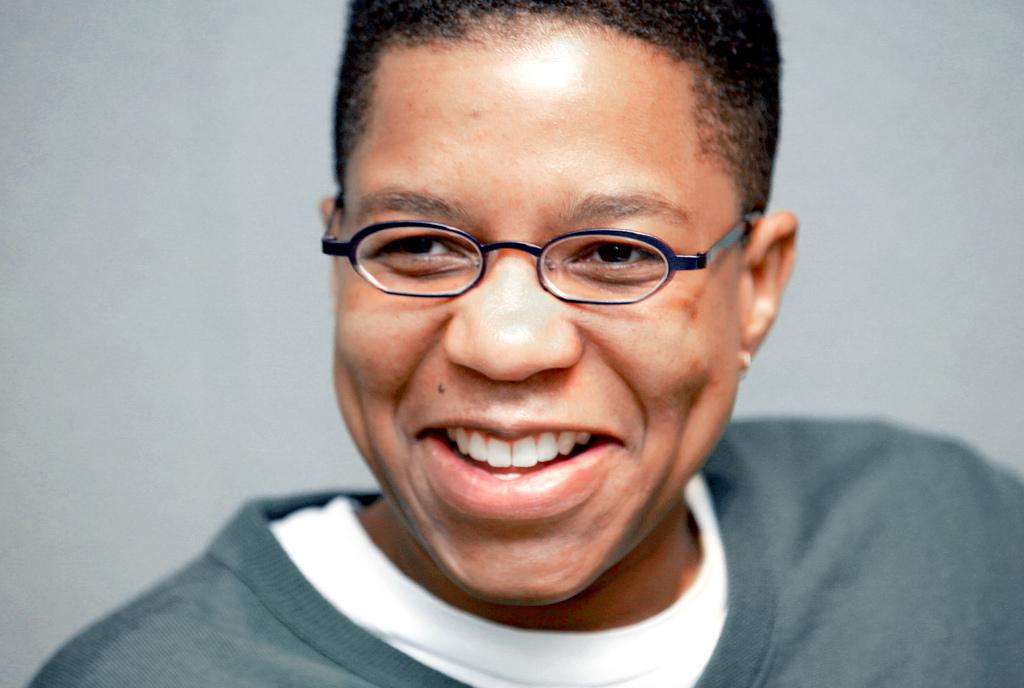Episode 204: Declaring Racism A Public Health Crisis; The Hidden History Of Black Vermonters
This week on NEXT, we talk about the different ways racism has become a public health crisis. Plus, the story of recent efforts to resurface the history of Vermont’s 19th century Black communities after some residents tried to cover it up. And unexpected lessons from scientific inventions that have transformed our lives.
New England Cities, Governments Respond To Calls For Change In Wake Of Protests

On June 24, 2020, the Christopher Columbus statue that was in New Haven, Conn.’s Wooster Square is lowered onto a city public works truck. It may end up in a Knights of Columbus Museum in downtown. (Ryan Caron King/Connecticut Public/NENC)
Protests over police violence and racism continue across the country. And some state and local government leaders in New England are starting to announce changes. New Haven, Connecticut removed a statue of Christopher Columbus from a historically Italian American community in the city on Wednesday. Not everyone was in favor of the move and scuffles broke out. But Nicolas Phillips, a Puerto Rican who lives near the statue, said the Indigenous culture that’s part of his heritage was stolen from him by European colonists.
“I think about what that statue means to me, and I’ve always despised that thing,” Phillips told Connecticut Public Radio. “And I couldn’t be happier to be here today watching it come down.”
In Rhode Island, Gov. Gina Raimondo issued an executive order Monday removing the phrase “Providence Plantations” from the state’s name in official documents and websites. The state’s entire, formal name is State of Rhode Island and Providence Plantations.
“We can’t ignore the pain conjured by the word ‘plantations,’” Raimondo said. “We can’t ignore how painful that is for Black Rhode Islanders to see that and have to see that as part of their state’s name.”
State lawmakers are working to get a question on the November ballot, allowing voters to decide if “and Providence Plantations” should be permanently removed from Rhode Island’s official name — not just in documents and websites. Voters rejected that move in 2010.
Also this month, Boston Mayor Marty Walsh declared racism a public health crisis, joining several other cities and towns in the region.
“What I’m announcing today is the beginning, it’s not the end. There will be more announcements and more work that we have to do,” Walsh said at a press conference this month. He has proposed re-allocating $12 million from the Boston Police Department’s overtime budget to public health, among other things.

The Self-Defense Brigade Anti-Oppression Rally for George Floyd, at the Keney Park Woodland entrance in Hartford on June 1, 2020. (Joe Amon/Connecticut Public/NENC)
In an interview with NEXT, medical expert Dr. Cato Laurencin described the different ways racism affects health, including racial profiling and the killing of Black people by police — along with other pervasive problems that may seem more subtle, such as redlining in housing and unconscious bias in the medical setting.
“Racism is the prime preexisting and existing condition contributing to the negative health consequences of Black people,” said Laurencin, a professor of orthopedic surgery at the University of Connecticut and editor-in-chief of The Journal of Racial and Ethnic Health Disparities.
New Study Says Racial Factor In Some Medical Algorithms Could Be Disadvantaging Black Patients
A new study in the New England Journal of Medicine is raising questions about the use of race in some medical algorithms that help guide doctors on how to treat patients.
According to Dr. Darshali Vyas, a resident physician at Massachusetts General Hospital and lead author of the study, race is a factor considered in a number of medical algorithms, even though many do not provide a rationale for including race into their calculations. Vyas and her co-authors analyzed algorithms that serve as medical tools for doctors in determining care for heart disease, kidney transplants, birthing, cancer and osteoporosis, among other conditions.
Their findings suggest that race-adjusted algorithms could push medical workers to provide better care for white patients than Black patients.
“We think a lot of these tools should be revisited on an individual basis,” Vyas told NEXT.
NEXT Wants to Hear From You:
Have you felt disadvantaged in the healthcare system because of your race or ethnicity? What happened? And did you get the care you needed? Leave a voicemail on our comment line: 860-275-7595. Or send us an email at next@ctpublic.org.
Last week, we asked you about a topic that is being debated regionally and across the U.S.: Should police departments be defunded or restructured?
We got this email from NEXT listener Kent Goodwin of Stowe, Vermont:
The role of the police should be limited to dealing with criminal acts and violence, maintaining public order and the protection of life, safety and property (while allowing peaceful protest and protecting protesters’ safety). Funding should be limited to support these activities only. Police department funds currently allocated to mental health issues, addiction and domestic disputes should be reallocated to mental health, social service and drug addiction agencies.
Police officers with regressive racial attitudes need to be identified and purged from police forces. Police recruitment should emphasis candidates that believe in racial equality.
Abandon chokeholds and abolish qualified immunity for police officers.
Remembering Vermont’s 19th Century Black Communities

The history of Black people establishing communities in Vermont during the 1800s has been scrupulously researched by one author, and it is just being uncovered by others. (Elodie Reed/VPR)
“What’s the history of Hinesburg, Braintree and other Black communities in the 1800s? How were they started, and are they being remembered?” Vermont Public Radio listener Gale Harris asked the station’s podcast Brave Little State.
VPR investigative reporter Emily Corwin looked into that question and found a forgotten history that some Vermonters take pride in upon learning, while others have tried to cover it up.
This history exists in other New England states, too. Last year, Maine Public Radio’s Willis Ryder Arnold explored the question, “Why is Maine so white?” He found it hadn’t always been that way.
Ainissa Ramirez: ‘The Alchemy Of Us’ And How Scientific Inventions Have Transformed Our Lives

‘Science evangelist’ Ainissa Ramirez wrote about eight scientific inventions and how they’ve shaped us in her recent book ‘The Alchemy of Us.’ (Chion Wolf/Connecticut Public)
Did you know that before the clock was invented, we used to sleep in two installments? Or that the standardization of cameras and film led to racial bias in the production of photographs?
“Technology and science is not neutral. They are endeavors that come from humans, and we have biases,” Ainissa Ramirez, a material scientist and former Yale University professor, told NEXT. “So how we think about the world goes into our inventions.”
In her book, “The Alchemy of Us,” which came out this spring, Ramirez writes about eight inventions and how they have transformed our lives in unintended ways.
Ainissa Ramirez is the host of the podcast Science Underground.
Also On This Week’s Show:
- A Dual Degree From Oxford. A Medical Degree From Harvard. Neither Protected Me From Racism (WBUR)
- ‘I Don’t Look Like The People That Are In That Sphere,’ Maine Muralists Pay Tribute To George Floyd (Maine Public)
- Remembrance: Catherine Forrester, 90, Moved To Springfield Area In ’60s ‘To Do Better’ (NEPR)
About NEXT
NEXT is produced at Connecticut Public Radio
Host/Producer: Morgan Springer
Executive Editor: Vanessa de la Torre
Senior Director: Catie Talarski
Intern: Daniela Luna
Contributors to this episode: Tafadzwa Muguwe, Emily Corwin, Willis Ryder Arnold and Carrie Healy.
Guests: Cato Laurencin, Darshali Vyas and Ainissa Ramirez.
Music: Todd Merrell, “New England” by Goodnight Blue Moon, “The Sea” and “Wanderer” by Francesca Blanchard, “Sunrise Outro” by Dave Richardson and “Thanks for Playing” by Kerrin Connolly.
New to NEXT? You can find every episode or one you missed within our archives.
We want your feedback! Send critiques, suggestions, questions and ideas to next@ctpublic.org. Help us spread the word! If you like what you hear, rate and review us on iTunes.
